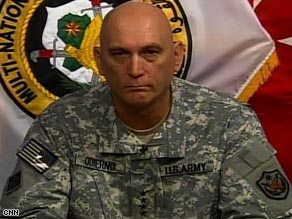
Gen. Ray Odierno, the top U.S. military commander in Iraq, said Sunday he believes U.S. troops will be out of the country by the end of 2011.
On CNN’s “State of the Union,” chief national correspondent John King asked Odierno to rate his confidence, on a scale of 1 to 10, that U.S. troops would be out by the end of the timeline agreed by the U.S. and Iraqi governments. “As you ask me today, I believe it’s a 10 — that we will be gone by 2011,” Odierno responded. One of the key architects of the troop “surge” strategy in Iraq, Odierno said conditions in the war-torn country have “improved significantly” in the past year or so. “Obviously, we still have some very serious incidents … but, again, it’s much safer,” he said. Nine U.S. troops were killed in March, the lowest monthly toll since the beginning of the Iraq War in 2003, he said. Watch Odierno share his assessment with CNN’s John King » “So, there’s been a clear improvement of security here,” Odierno said. “The issue is: Can we maintain that Can the Iraqis maintain it And that’s what we’re working through now. We want them to be able to maintain this stability as we pull out.” But less than two weeks into April, the U.S. toll for the month is already at nine. Asked whether the attacks were a sign of increased coordinated violence, Odierno responded that “there are some cells out there who are still capable of conducting suicide attacks,” though he described the cells as “very small.” Watch as general discusses joining Facebook »
Don’t Miss
Suicide bomber kills 9 in Iraq
Obama wants another $83 billion for Iraq, Afghanistan
Baghdad rally marks 6-year anniversary of Saddam’s fall
U.S. forces prepare for withdrawal
The U.S. military has made it more difficult for foreign fighters to get into Iraq through Syria, but there is still support for the Iraqi insurgency coming from Iran, he said. Mowaffak al-Rubaie, Iraqi national security adviser, said the Iraqi government is making improvements in handling its own security. “We, the government of Iraq and the security forces in Iraq are much more suited now for this fight,” al-Rubaie told “State of the Union.” “And we believe that now we are leading and we are planning and carrying out most of the combat operations in the country, ” he said, “and the United States forces are moving or transitioning to a more support role, more training, more providing more logistical support, rather than engaging in a huge military or kinetic combat operations.” Al-Rubaie was mum when asked how President Obama has differed from former President George W. Bush. Watch al-Rubaie discuss Iraq’s future » “I don’t want to elaborate on differences,” al-Rubaie said. “But I believe that President Obama understands the situation in Iraq and I believe he wants to stick by … the withdrawal agreement.”
Odierno described Obama as “very attentive.” “He listens. He’s incredibly intelligent. He talks through the issues,” Odierno said. “He makes a decision and then we execute those decisions, and that’s all you can expect out of your commander-in-chief. And I’ve been very pleased with the interaction that I’ve been able to have with him.”